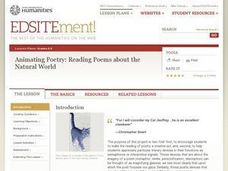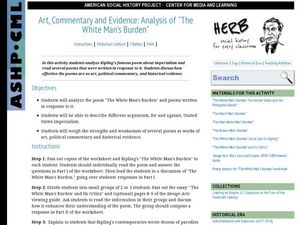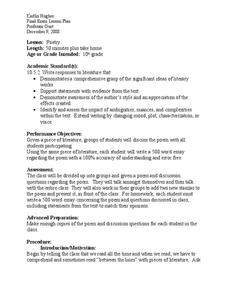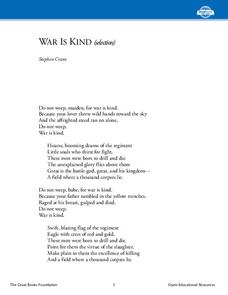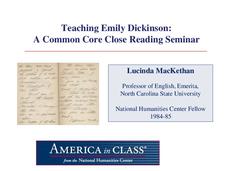National Endowment for the Humanities
Animating Poetry: Reading Poems about the Natural World
Young scholars complete poetry analysis activities. In this poetry analysis instructional activity, students consider the use of imagery and sound devices in poetry. Young scholars translate poetry into another art, read a diverse...
Curated OER
Shelley's Poems by Percy Bysshe Shelley
In this online interactive reading comprehension learning exercise, students respond to 15 multiple choice questions based on poetry by Percy Bysshe Shelley. Students may submit their answers to be scored.
National Endowment for the Humanities
Understanding the Context of Modernist Poetry
Students examine the historical, social, and cultural context of modernist poetry. They explore websites, complete a chart, compare/contrast rural and urban life, watch a video of early New York, and complete a writing assessment...
Curated OER
Ho Ho Poetry
Students read about the sights and sounds of a Las Vegas Christmas. They use words and phrases taken from articles in a recent issue of the New York Times to create a holiday-themed "found Poem."
Curated OER
Write Your Own Poem: Rhyming Word Pattern -end, -ind, -and
In this rhyming verse worksheet, students read 20 words in a chart and color them according to the directions, using a different color for each ending rhyme pattern. Students then answer 10 questions in which they write simple nonsense...
K12 Reader
Poetry Uses Rhyme
It's rhyme time! After reading a short article about poems that rhyme, kids take the time answer questions about the message of the passage.
Southern Nevada Regional Professional Development Program
Reading Literature - The Ruin
Cross-comparison, the technique of focusing on two different texts with the same themes, motifs, events, etc., is employed in an exercise that asks groups to examine two different translations of “The Ruin,” a poem, written in Old...
Curated OER
Great Robert Frost Poems: Fun Trivia Quiz
This 10-question quiz tests familiarity with several Robert Frost poems. Before giving this quiz, you will want to review the questions to be sure you've covered each of the poems.
Curated OER
Art, Commentary and Evidence: Analysis of "The White Man's Burden"
A cross-curricular lesson combines poetry and history for your middle and high schoolers. The class critically examines Kipling's poem, "White Man's Burden" as historical evidence of the Imperialist ideology popular during his time. The...
Curated OER
War Literature
Working in groups, young historians review a war poem written by Stephen Crane. After reviewing the poem, they present an oral interpretation of the poem and hold a panel discussion about their analysis. The panel is made up of five or...
Curated OER
Jabberwocky Questions
In this poetry analysis worksheet, students answer 5 short answer and essay questions based on the content and literary elements of Lewis Carroll's poem "Jabberwocky." Questions require students to compare good and evil forces in the...
Curated OER
Poetry
Tenth graders write a poem. In this poetry lesson, 10th graders read the poem The Road Not Taken written by Robert Frost, answer discussion questions, add new stanzas to the poem and share them with the class.
Curated OER
Poems about Places
In this Poems about places worksheet, students read short biographies and poems of 4 selected poets. Students discuss each poem at length, and complete short answer essay questions.
Prestwick House
Rhyme and Repetition in Poe's "Annabel Lee"
Many and many a year ago Edgar Allan Poe crafted the chilling tale of "Annabel Lee." The poem is the perfect vehicle to introduce Poe's concept of unity of effect, the idea that every element in a poem or story should help to develop a...
Prestwick House
Teaching Shakespeare: Sonnet 73
It's that time of year to consider how Shakespeare selects his images and structures his Sonnet 73 to develop the meaning of the poem. Class members examine the rhyme scheme, the indented lines, the conceit, and the images used in each...
Weber County Library
Abstract Ideas Explored: Writing with Extended Metaphor
A 25-page packet includes eight detailed lesson plans centered around poems by Emily Dickinson. Each lesson begins with a burning question that students attempt to answer by using evidence from Dickinson's poems.
Prestwick House
"Because I could not stop for Death" -- Visualizing Meaning and Tone
Emily Dickinson's "Because I could not stop for Death" provides high schoolers with an opportunity to practice their critical thinking skills. They examine the images, diction, rhythm, and rhyme scheme the poet uses and consider how...
Great Books Foundation
War Is Kind
Ponder the complexities of war, peace, and country with Stephen Crane's "War is Kind." After reading the poem, learners answer six questions in a class discussion or as an individual assessment.
National Humanities Center
Teaching Emily Dickinson: A Common Core Close Reading Seminar
Three of Emily Dickinson's poems, "I like to see it," "Because I could not stop for Death," and "We grow accustomed to the Dark," provide instructors with an opportunity to model for class members how to use close reading strategies to...
Busy Teacher’s Café
"Smart" by Shel Silverstein
Find out just how smart your young mathematicians are with this cross-curricular math and language arts lesson. After first reading Shel Silverstein's poem "Smart", students draw pictures of coins to model the different exchanges...
Prestwick House
Poe’s “The Raven” – Unity of Effect
How do Poe's choices of imagery, rhythm and rhyme scheme, and structure help build the desired single effect of "The Raven"? After listening to a dramatic reading of the poem, class members consider whether Poe's choices do...
National Endowment for the Humanities
Lu Shih — The Couplets of T’ang
Writing poetry in ancient China was the modern equivalent of sending a greeting card. Scholars learn about the ancient Chinese poetic form called the lu shih. They read about the context of poetry during the T'ang Dynasty and complete a...
E Reading Worksheets
Tone Worksheet 4
A poet's word choice can be the difference between a poem that is merely sad, and a poem full of heartbreaking regret. Middle schoolers discern the tone in four different poems, noting the relevant textual evidence that supports...
E Reading Worksheets
Tone Worksheet 1
Discern the tone in four selected poems with a straightforward assignment. Junior high readers analyze the authors' word choice and text structure to define a tone for each poem, as well as each poem's meaning.
